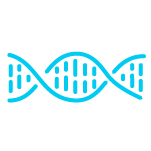Hartwig Medical OncoAct
Complete DNA Test for Cancer Diagnostics
Treating Physician PatientView the video:
From biopsy to reportPersonalized Treatments Increasingly Important for Good Cancer Care
Each year 120,000 people are diagnosed with cancer in the Netherlands. 45,000 of them have metastatic cancer. 20,000 people have a rare form of cancer. Each year 45,000 people die from the disease. Cancer is an individual disease. No two patients have the same tumor.
Cancer is caused by defects in the DNA. Targeted medication repairs the mutations in these cells.
Extensive DNA tests on a tumor can provide treating physicians with additional information about the clinically relevant properties of the tumor (biomarkers) that may be indicators of a favourable response to treatment. Changes to the genetic profile (mutations) can sometimes provide indicators for a treatment that directly addresses these mutations. This is called targeted therapy. DNA tests can also help when selecting patients for studies or experimental medication.

DNA test
Hartwig Medical OncoAct®
Hartwig Medical OncoAct® is the most extensive molecular diagnostic DNA test for identifying and describing the characteristics of the tumor. The test is provided by Hartwig Medical Foundation. This DNA test, based on whole genome sequencing, analyses the entire DNA of the tumor and identifies all relevant genetic characteristics that may provide indicators for treatment.

OncoAct WGS report
Hartwig Medical OncoAct®
Hartwig Medical OncoAct® consists of an complete analysis of the tumor DNA and the OncoAct WGS report. It presents a summary of the mutations and other changes in the DNA profile that may be important for proposing personalized treatment. This may involve existing registered medications. In some instances these may also be medications that are registered but not for the cancer type in question (“off-label”). If there are any possible indicators for participation in an experimental treatment, this will also be shown in the OncoAct WGS report. The DNA test may not even provide any further indicators for treatment options. In a limited number of cases there is no result because the biopsy contains too few tumor cells to perform a DNA analysis.